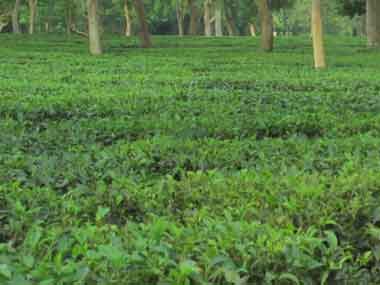Golaghat: Assam tea planters today called for a single hotline phone number along with deployment of drones/unmanned aerial vehicles to ensure adequate security for executives and workers of the industry. “We appeal to the government to provide the tea industry a single hotline phone number in every tea growing area so that well-equipped and well-manned police and paramilitary forces arrive at the spot within 30 minutes of receiving a phone call,” North East Tea Association (NETA) chairman Bidyanand Barkakoty said in Golaghat.[caption id=“attachment_852571” align=“alignleft” width=“380”] An Assam tea garden. Simantik Dowerah/Firstpost[/caption] Tea executives stay in remote estates and on several occasions it had been observed that timely arrival of police/paramilitary forces could have saved many precious lives of tea executives and estate owners, Barkakoty said while addressing NETA’s 16th Biennial General meeting. “Many times it has been found that though the nearest police station had been informed but they express helplessness due to non-availability of required force,” he said. Drones/Unmanned Aerial Vehicles (UAVs) should also be deployed in tea growing areas for surveillance and to track movement of militants, armed gangs and green leaf thieves and dacoits, Barkakoty added. NETA also urged the Centre to shift the head office of Tea Board from Kolkata to Guwahati to serve the greater interest of people connected with tea cultivation. “Assam alone produces about 53 percent of the country’s total tea and according to our estimate the North-East will churn out more than 65 percent of the country’s tea but still the Tea Board has not been headquartered in Assam,” he added. Barkakoty also called for reforms in the auction system as the present e-auction platform needs a lot of technical changes and is merely a computerisation of the old manual system. “Only 50 percent of our produce is sold through auction centres, but in most of the cases, auction prices are taken as benchmark to determine the prices of the remaining 50 per cent of teas sold through other channels of sale and as such the auction system needs to be made more robust,” he said. Among the major issues affecting the tea industry in Assam are climate change, shortage of labour and absenteeism of the workforce. “High intensity rainfall of shorter duration and longer dry spells has resulted in flood and drought scenario thereby affecting tea production,” he said. Shortage of labour is a problem faced by the whole spectrum of the tea industry i.e. large, medium and small with counselling and training, automation being some of the possible solutions to this problem. Besides, on an average 30 percent of the workforce are absent every day in many tea estates and the MGNREGA schemes are one of the major reasons for this. NETA also appeals to the state government to include a chapter in school textbooks on tea, its health benefits and role in economy and society while the centre should declare tea as the National Drink of India. Assam government has already declared tea as the state drink by a notification last year. PTI
An Assam tea garden. Simantik Dowerah/Firstpost[/caption] Tea executives stay in remote estates and on several occasions it had been observed that timely arrival of police/paramilitary forces could have saved many precious lives of tea executives and estate owners, Barkakoty said while addressing NETA’s 16th Biennial General meeting. “Many times it has been found that though the nearest police station had been informed but they express helplessness due to non-availability of required force,” he said. Drones/Unmanned Aerial Vehicles (UAVs) should also be deployed in tea growing areas for surveillance and to track movement of militants, armed gangs and green leaf thieves and dacoits, Barkakoty added. NETA also urged the Centre to shift the head office of Tea Board from Kolkata to Guwahati to serve the greater interest of people connected with tea cultivation. “Assam alone produces about 53 percent of the country’s total tea and according to our estimate the North-East will churn out more than 65 percent of the country’s tea but still the Tea Board has not been headquartered in Assam,” he added. Barkakoty also called for reforms in the auction system as the present e-auction platform needs a lot of technical changes and is merely a computerisation of the old manual system. “Only 50 percent of our produce is sold through auction centres, but in most of the cases, auction prices are taken as benchmark to determine the prices of the remaining 50 per cent of teas sold through other channels of sale and as such the auction system needs to be made more robust,” he said. Among the major issues affecting the tea industry in Assam are climate change, shortage of labour and absenteeism of the workforce. “High intensity rainfall of shorter duration and longer dry spells has resulted in flood and drought scenario thereby affecting tea production,” he said. Shortage of labour is a problem faced by the whole spectrum of the tea industry i.e. large, medium and small with counselling and training, automation being some of the possible solutions to this problem. Besides, on an average 30 percent of the workforce are absent every day in many tea estates and the MGNREGA schemes are one of the major reasons for this. NETA also appeals to the state government to include a chapter in school textbooks on tea, its health benefits and role in economy and society while the centre should declare tea as the National Drink of India. Assam government has already declared tea as the state drink by a notification last year. PTI
Deploy drones for garden security: Assam tea planters to govt
FP Archives
• June 7, 2013, 20:42:40 IST
Drones/UAVs should be deployed in tea growing areas for surveillance and to track movement of militants, armed gangs and green leaf thieves, NETA said.
Advertisement
)